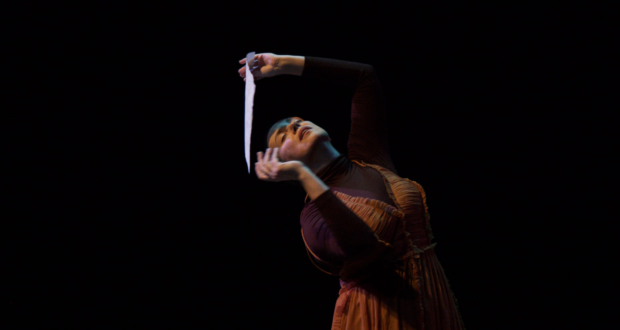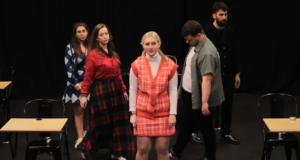A breath-taking show using music and movement to explore childhood memories, the impact of war and the desire to return home. Summary
Rating
Unmissable!
The last time I was abroad was in Croatia. I had an amazing time exploring Zagreb, Split and various coastal islands. Whilst keen to enjoy the beaches and bars, we were also interested to find out more about the country’s history. A moment that stuck was on a walking tour of Zagreb. Our guide, roughly the same age as myself, shared memories of his childhood spent during the war in the nineties. Although I was aware of the war, hearing someone of my generation talk about growing up in a war zone was quite startling. I’m reminded of this as there is a moment in The Return, a one woman show conceived and performed by Natasha Stanic Mann, when she directly asks the audience if they’ve visited Croatia. She reflects on people saying how beautiful her country is, repeats the word until it sounds somewhat trivial compared to the memories she is about to share.
Mann’s performance is striking, thought provoking and, on occasion, completely bewildering. There’s no clear narrative to the show, memories and stories flit from her great grandparents meeting in Ukraine during the first World War to legal issues she’s having in the present day. Then there are childhood memories of growing up in a socialist block of flats (where her mother still lives) to issues with bullies. Each memory is interspersed with movement and music, moments which steal the show. Although the music varies during these interludes, the most impactful and stunning is the folk style, a solo violin and voice. Mann’s accompanying movements are at times jagged and uncomfortable to watch yet strangely entrancing, open to interpretation, occasionally clearly link to the memories she is sharing. She is a mesmerizing performer, and despite watching on a small screen it is utterly engrossing.
The most striking and harrowing section sees Natasha reflects on the war, when she was in her twenties. At first, she talks on how it didn’t impact her life that much, she’s rather matter of fact about her extended family being displaced. But the impact becomes clearer when she talks about her twenties being ‘hijacked’ – she lets her hair down in raves but still reminisces on the fact that other people her age could enjoy their youth in free Europe. What follows is a period of air raid sirens and more powerful movement from Natasha. The sound of the air raid and accompanying movement go on for longer than is comfortable to watch, showing the obvious impact of the war despite an earlier sense of denial.
Occasionally Natasha speaks in Croatian, and although it might help to have subtitles, this is obviously intentional. How can we ever truly understand what it means to be Croatian, as tourists in this “beautiful” country. Natasha tells the audience how she has moved away, moved on. Yet despite all this she still feels a sense of home. The final section of movement and music in the show is brilliantly conceived to show the pull of home, the desire to return.
Conceived and performed by: Natasha Stanic Mann
Devised with: Filomena Campus, Andres Velasquez
Produced by: Natasha Stanic Mann
The Return is available as part of The Cockpit’s On Demand service until 25 February 2021. Tickets are £6.
 Everything Theatre Reviews, interviews and news for theatre lovers, London and beyond
Everything Theatre Reviews, interviews and news for theatre lovers, London and beyond



